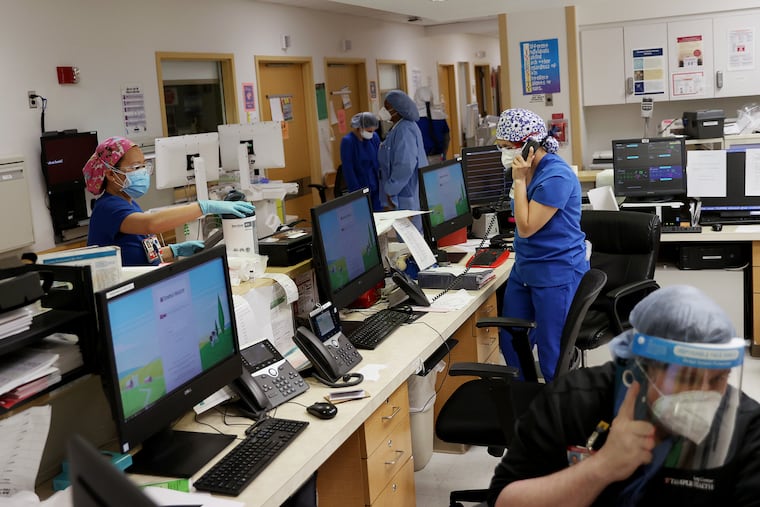On the coronavirus front lines: Part-time nurse, full-time worry l Expert Opinion
When I am home, sitting on the bench, I feel even more distressed than when I am working as a nurse practitioner.

I am a front-line provider, but only part-time. This has caused me to feel so many competing emotions. But should I only be feeling these emotions part-time?
I am anxious. When I am home, sitting on the bench, I feel even more distressed than when I am working as a nurse practitioner. I am anxious about all of the unknowns in the coming weeks. In the days leading up to work, the anxious anticipation is palatable. I am nervous about possible exposure for myself, but more for the unknown transmission to my family. I can't sleep on those days. I am anxious that the virus will live on my clothes, my shoes or my phone when I come home after a long shift and I will infect my innocent family.
If I do contract COVID-19, I am anxious about what’s next. Sure, I could recover as I would from a common cold. Or I could have a severe case because of my exposure to seriously ill patients where I develop respiratory failure. Or worse I could infect my loved ones and they may require hospitalization.
I am experiencing death anxiety. I am, by proxy, familiar with the anxiety patients who are seriously ill feel when faced with their own mortality. I have guided countless patients through their death anxiety, from the 38-year-old mother of two with aggressive lymphoma, or the 42-year-old man with complications related to HIV, to the 81-year-old woman with a progressive neurological disorder.
While no less tragic, most of my patients have some time to consider how they want to live the rest of their lives. Yet, in the times of this horrible pandemic, no one knows who will be affected and who will die. I feel a sense of dread when I picture myself dying and leaving my husband a widow and my children motherless. My anxiety affects me both physically and emotionally. I am short-tempered. I cry. And my heart races when I think these unimaginable thoughts.
I am worried. Knowing what I know about COVID-19 – the highly contagious transmission, the high incidence of acute respiratory distress syndrome, and the rising mortality rate – I worry about the future. I worry about those I love who may be personally impacted by the virus. I worry about my patients, dealing with cancer; their lives already turned upside, now panicking at the thought of a virus causing their death before the cancer. I worry about how long this will last. I worry about the impact of this pandemic on the world and on our health system. I worry about my full-time colleagues who are experiencing unprecedented daily distress, grief, and trauma that will ultimately culminate. I worry about the post-traumatic stress that they will experience in the future when looking back.
I am scared. I am scared of the unknown. Fear is difficult to separate from anxiety and worry. These intertwined emotions weave into a bigger ball inside me every day as uncertainty builds. I am scared when I see the number of cases in Philadelphia, in Pennsylvania, in the United States, and in the world ever-increasing. When will it peak? I live in fear, waiting for the experts to say we are on the other side. And then, of course, I fear the second wave.
In fleeting moments, I am relieved. I am relieved that, for now, my family is safe. I am relieved that my risk is low because I am only in contact with patients part-time.
And finally, I am feeling conflicted. I feel all these emotions. Anxious to work, happy to be home – safe most of the time. I hope to protect my family from the possible exposure of a positive patient that I may encounter. I hope to serve my patients in the best way possible, fully present when I am working. I hope to serve my colleagues who are putting themselves at far greater risk than me. In over a decade of clinical experience, I used to be proud of my learned ability to leave work at work in order to be fully present at home. In crisis, though, it is impossible to compartmentalize.
I am a part-time front-line provider and I feel the distress of COVID-19 every day.
Anessa M. Foxwell, MSN, CRNP, ACHPN, is a fellow at New Courtland Center for Transitions and Health at University of Pennsylvania School of Nursing and part-time nurse practitioner at Penn Medicine.